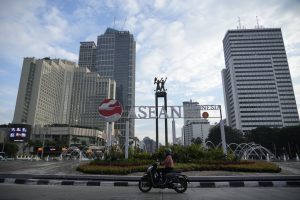Southeast Asia’s top diplomats will gather in Indonesia today to kick off a clutch of important Association of Southeast Asian Nations (ASEAN) meetings, which will grapple with an agenda crowded with regional and international concerns.
The 56th ASEAN Ministerial Meeting begins today in Jakarta and will be succeeded by a string of post-conference meetings and summits, which will culminate in the convening of the ASEAN Regional Forum on July 14.
As over the past few years, the meetings find the Southeast Asian bloc in a tricky spot, with civil war raging in Myanmar and tensions growing between some ASEAN members and China in the South China Sea.
The Russian invasion of Ukraine and the escalating rivalry between the United States and China will also receive a thorough airing, given that U.S. Secretary of State Antony Blinken, Russian Foreign Minister Sergey Lavrov, and Chinese Foreign Minister Qin Gang will all participate in meetings scheduled for Thursday and Friday.
While ASEAN has no direct say over the course of events in Washington, Beijing, Moscow, or Kyiv, the crisis in Myanmar bears directly on its identity as a mature, cohesive regional bloc that is able to act as an honest diplomatic broker.
This has been severely tested since Myanmar’s armed forces launched a coup in February 2021 and plunged the country into deadly chaos. Since then, 3,770 civilians, including anti-coup activists, have been killed by security forces and nearly 24,000 arrested since the military takeover, according to the conservative estimates of the Assistance Association for Political Prisoners, which keeps a running tally of arrests and casualties.
ASEAN has attempted to resolve the conflict by means of the bloc’s stillborn Five-Point Consensus peace plan, which calls for an immediate cessation of violence as a prelude to inclusive political dialogue.
As has become customary, ASEAN has barred Myanmar’s ruling generals from this week’s meetings for its lack of efforts to implement – indeed, its outright and constant violation of – the Five-Point Consensus. At the same time, Indonesia, as this year’s ASEAN chair, has engaged in busy “quiet diplomacy” aimed at its implementation.
Foreign Minister Retno Marsudi claimed last week that the government had conducted 110 engagements “in the form of in-person meetings, virtual meetings, and phone calls” with representatives of the military, the opposition National Unity Government (NUG), and various ethnic armed organizations and civil society groups. “ASEAN is still very concerned about the increasing use of violence in Myanmar which has resulted in civilian casualties and the destruction of public facilities,” Retno said. “This must stop immediately.”
As I wrote yesterday, such efforts, while laudable, are very unlikely to bear any fruit, given that neither side has shown any interest in sitting down with opponents that they mutually perceive as “terrorists.” Sure enough, Reuters cited two sources familiar with the efforts who said that attempts to create an inclusive dialogue have been “complicated by conditions put forward by all sides to start even informal talks.”
Another problem for ASEAN is the lack of unity over how to proceed. Some members, including Indonesia, Malaysia, and Singapore, have urged a more robust response, while others, such as Thailand, have advocated the reopening of high-level engagement with the military junta. The Associated Press reported today that a draft of a post-meeting communique that will be issued by ASEAN foreign ministers “remained blank on Myanmar, reflecting the difficulty of reaching agreement on the issue.”
All this makes it likely that this week’s meetings will end in the same place as most recent ones: with bland statements calling for restraint and the implementation of a peace plan that has virtually no purchase on the ground.
Indonesia will reportedly also seek to use this week’s meetings to revive the stalled talks on a Code of Conduct on the South China Sea between ASEAN and China to create a set of rules to ensure freedom of navigation and overflight in the economically important seaway. The past year has seen an upswing in the number of Chinese incursions into waters claimed by Vietnam and the Philippines, as well as the greater willingness of ASEAN claimant states, particularly the Philippines, to denounce and publicize them.

































